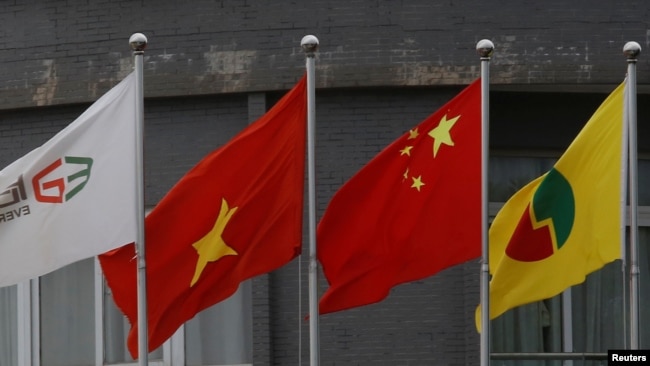米中貿易摩擦の影響を回避する思惑から、中国にいては商売がしにくいという事情があるようですね。
これとは別に、製造拠点をベトナムに移管する企業は増えることでしょう。安価な労働力と現地市場の将来が挙げられるようです。
※下記参照
図解で分かるベトナム経済:中国からベトナムへの製造拠点の移管 ~なぜベトナムなのか~ | ONE-VALUE株式会社
VOAで英語を学び、世界の今に目を向けましょう!!
コロナ後、中国のサプライヤーはベトナムに競り勝つ(和訳)
After COVID, Chinese Suppliers Race to Vietnam
2023 March 24
ベトナムは、北の隣国が昨年末にゼロコロナ政策を終了して以来、中国からの投資の波を享受しています。
2023年の最初の50日間に中国企業が45の新規プロジェクトに投資したことがベトナム政府のデータで明らかになりました。
サムスン、キヤノン、アップルのiPhoneを製造するホンハイなどの大手外資系企業は、すでにベトナムに工場を持っていました。しかし、その多くはまだ中国からの供給が中心でした。
業界の専門家は、新しい投資家のほとんどは、すでにベトナムに設立されている大企業の小規模サプライヤーだと言います。
この動きは、中国での人件費の高騰に加え、中国とのハイテク貿易に対する米国の規制の拡大に関連しています。
国境越えて
現在、ベトナムに投資する中国企業の大半は、ベトナムにすでに施設を持つ大企業に供給やサービスを提供する小規模な企業です。
例えば、ベトナムのソーラーパネル産業では、プラスチック成形、ダイキャスト、エネルギー貯蔵などの材料やサービスを提供する小規模なサプライヤーが増加しています。
昨年、ベトナムで行われた既製品の工場への主な投資のうち2件の背景には、中国のパネルメーカーのサプライヤーがあったとCBRE Groupは述べています。このような工場は、新しい国に進出する際、中小企業に好まれることが多いのです。
中国の電子機器、ロボット、家電メーカーも、昨年ベトナムで産業用リースを利用した企業の上位に名を連ねていることがデータで示されています。
その他、床材メーカー、ガラスメーカー、アップル社製デバイスの箱や部品のサプライヤーなども含まれていると、Vietnam Investment Consultingの代表であるドゥ・ホン・クァン氏は語ります。
パンデミックの影響で世界中の製造業がまだ正常化に苦労している中、中国企業はベトナムの新工場に前年同期比で2億5000万ドル多く投資していることが公式データで明らかになりました。これはシンガポールからの投資に次ぐもので、韓国や日本といった従来の大口投資家よりも多いものです。
対立の歴史
ベトナムへの進出は、中国企業にとってリスクがないわけではありません。
両国は長く血なまぐさい歴史を持っています。そして今日、中国とベトナムは、南シナ海の海域と島々で水で競合する主張を持ついくつかの国のうちの一つです。
そして2014年には、反中感情からベトナムの暴徒が中国の工場を標的にしました。
中国企業の投資申請は慎重に検討される傾向にあり、その結果、遅延や却下が発生します。また、中国企業は労働者のビザや許可証を取得するのに長い待ち時間がかかると、フィリッポ・ボルトレッティ氏は言います。彼は投資コンサルタント会社Dezan Shiraに所属しています。
しかし、このようなリスクは、小規模なサプライヤーを遠ざけるには十分ではありません。
After COVID, Chinese Suppliers Race to Vietnam
Vietnam has enjoyed a wave of investment from China since its northern neighbor ended its zero-COVID policy late last year.
Chinese companies invested in 45 new projects in the first 50 days of 2023, Vietnamese government data showed.
Major foreign companies including Samsung, Canon, and Hon Hai, the maker of Apple iPhones, already had factories in Vietnam. But supplies for many still largely came from China.
Industry experts say the new investors are mostly smaller suppliers to larger companies that were already established in Vietnam.
The move is related to the rising cost of labor in China, in addition to expanding U.S. restrictions on high-tech trade with China.
Border crossing
Those smaller firms offering supplies and services to larger companies with facilities already in Vietnam now make up most of the Chinese companies investing in Vietnam.
For example, in Vietnam's solar panel industry, there has been an increase of small suppliers to provide materials and services such as plastic molding, die casting and energy storage.
Last year, Chinese panel maker suppliers were behind two of the main investments in Vietnam in ready-made factories, says the CBRE Group. Such factories are often favored by smaller firms when entering new countries.
Chinese electronics, robotics and home appliance firms were also among the top spenders on industrial leases in Vietnam last year, the data showed.
Others included flooring firms, glass makers and suppliers of cartons and parts for Apple devices, said Do Hong Quan, head of Vietnam Investment Consulting.
As manufacturers worldwide still struggle to normalize because of the pandemic, Chinese firms have spent $250 million more on new factories in Vietnam as compared to the same period a year earlier, official data showed. That is second only to investment from Singapore, and more than traditionally bigger investors such as South Korea and Japan.
History of conflicts
Making the move to Vietnam is not without risks for Chinese businesses.
The two countries have a long and bloody history. And today, China and Vietnam are among several countries that have competing claims in the waters and islands in the South China Sea.
And in 2014, anti-Chinese sentiment caused Vietnamese rioters to target Chinese factories.
Investment applications from Chinese firms tend to be studied with extra care, resulting in delays or rejections. Chinese firms also experience longer wait times to get visas and permits for workers, said Filippo Bortoletti. He is with investment consultant firm Dezan Shira.
However, such risks are not enough to keep small suppliers away.
Words in This Story
facility - n. large building that is built for a special purpose
appliance - n. household machines such as stove, microwave, dishwasher...
sentiment - n. an attitude or opinion
application - n. official request for something
tend - v. used to describe something likely to happen
